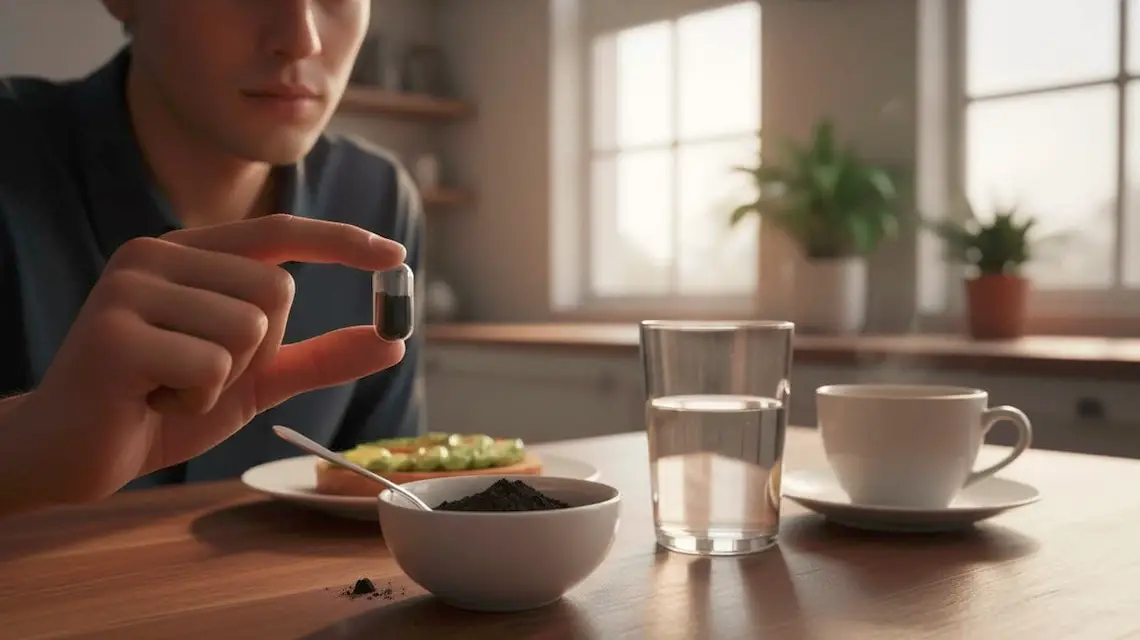Can you take activated charcoal in the morning? Many people have heard that a charcoal capsule before breakfast is a quick detox hack. The promise sounds simple, and that’s why you’re curious. Here’s the clear answer you’re looking for.
You can take activated charcoal in the morning, but it’s usually not a good habit. Timing matters because charcoal can reduce how well your body absorbs medicines, vitamins, and nutrients. If you take daily meds or supplements early in the day, morning charcoal can get in the way.
This guide explains how charcoal works, the best timing if you still want to try it, who should avoid it, safer dosing, and better morning alternatives that support energy and digestion.
Can you take activated charcoal in the morning? The short answer and best timing
Yes, you can, but morning is often the worst time. Most people take daily meds, vitamins, or coffee with breakfast. Charcoal can grab some of those compounds in your gut, then your body absorbs less of them. That includes birth control pills and thyroid medication.
On an empty stomach, charcoal may act faster and bind more in the gut. That can help if your goal is to reduce gas from something you ate the night before. The tradeoff is higher risk of nausea or constipation. With food, charcoal’s effect drops, and it may pull nutrients from your meal.
If you still want to try it, use a simple spacing rule. Take charcoal at least 3 hours after any medication, and keep 2 hours before or after food and supplements. Many pharmacists recommend a 3 to 4 hour gap from any meds, including levothyroxine and birth control pills. If you take your meds in the morning, save charcoal for later. Late afternoon or evening fits better for many people, as long as it doesn’t clash with evening doses.
Keep this occasional. Charcoal isn’t meant for daily use. Frequent use raises the chance of constipation and nutrient issues.
What happens if you take charcoal first thing
First thing in the morning, charcoal can reduce absorption of your meds or vitamins. You might feel fine that day, but your medicine may not work as well. Some people feel queasy, and stools often turn black. Constipation is common.
If you take it with breakfast or coffee, it won’t work as well and may bind nutrients from your food. It can also upset your stomach.
Best time window if you still want to try it
If you still want to try charcoal:
- Take it on an empty stomach with water.
- Wait at least 2 hours before eating.
- Keep 3 to 4 hours away from any medication.
Spacing matters because charcoal grabs compounds in the gut before your body absorbs them. Give meds and nutrients time to pass through, then consider charcoal later.
Capsules versus powder: powder can act a bit faster because it disperses more, but it’s messy and can stain teeth and clothing. Capsules are easier and reduce mess.
When morning charcoal is a bad idea
Charcoal can affect many common morning medicines:
- Levothyroxine (thyroid)
- Birth control pills
- Blood pressure meds
- Antidepressants
- Seizure meds
- Diabetes meds
- Antibiotics
Simple rule: if you take any morning medicine, skip charcoal in the morning. Ask a pharmacist about your specific meds before using charcoal at any time of day.
What activated charcoal can and cannot do for your body
Activated charcoal is not magic. It works by binding some substances in your gut, then your body passes them. It does not clean your blood or flush your organs.
There’s some evidence it may help gas in some people, likely by trapping gas-causing molecules. Studies are mixed, and the benefit tends to be small. It’s not proven for general detox, weight loss, or glowing skin. Any claims that it resets your system or clears your liver are hype.
In emergency rooms, doctors sometimes give a large single dose for certain poisonings. That happens under medical care, often within a few hours of ingestion, and the doses are much higher than any supplement. That situation is not the same as taking small doses at home.
The hangover myth is popular, but charcoal does not bind alcohol well. It might help with some byproducts in the gut, but it won’t undo a night of heavy drinking.
How it works in simple terms
Charcoal adsorbs, not absorbs. Adsorb means particles stick to the surface of the charcoal. It only works in your gut, not in your bloodstream, so it can’t pull out toxins that are already inside your body.
Myths to skip: detox, weight loss, hangover cures
- Detox: Your liver and kidneys do that job already. Charcoal doesn’t make them work better.
- Weight loss: Charcoal doesn’t burn fat or curb appetite in a reliable way.
- Hangovers: It doesn’t bind alcohol well, so relief is limited at best. If you’re wondering can you take activated charcoal in the morning for a hangover, it’s not a fix.
When it might help, and when to call Poison Control
Charcoal might help short-term gas and bloating in some people. Evidence is mixed, and benefit varies.
If you suspect an overdose or serious poisoning, don’t self-treat. In the U.S., call Poison Control at 1-800-222-1222 right away. Medical doses for poisoning are much higher than supplement doses, and they are used under professional care.
Smarter morning swaps for energy and digestion
- Water with electrolytes: Rehydrates after sleep and supports alertness better than charcoal.
- High-fiber breakfast: Oats, berries, chia, or whole-grain toast help keep digestion regular.
- Gentle movement: A short walk or light stretches wake up your gut and mind.
- Probiotic foods: Yogurt, kefir, or fermented veggies can support a healthy gut over time.
- Limit alcohol before bed: Better sleep quality often helps morning energy more than any supplement.
Safe use guide: dose, timing, and interactions to avoid
Activated charcoal is best for short-term, as-needed use. Keep a wide gap from medicines and nutrients, drink plenty of water, and stop if you feel unwell. When in doubt, speak with a pharmacist.
Space it from meds, vitamins, and coffee
- Simple rule: keep charcoal 3 to 4 hours away from any medication.
- Keep at least 2 hours away from food, vitamins, and minerals.
- Use special caution with birth control pills, thyroid meds (levothyroxine), heart meds, seizure meds, antidepressants, antibiotics, and diabetes meds.
- Coffee and milk may reduce charcoal’s effect and can increase stomach upset. Use plain water.
Short-term dosing and forms
- Common OTC ranges for adults: 500 to 1000 mg as needed for gas, up to 1 to 3 times in a day, for short periods only. This is not a medical prescription, and evidence is mixed.
- ER dosing for poisoning is very different: often 25 to 100 grams as a single dose under medical supervision. Do not copy this at home.
- Practical tips: drink plenty of water, powder can stain teeth and fabric, use a straw, protect clothing, and brush after use.
Side effects and red flags
Common side effects: constipation, black stools, nausea, vomiting.
Less common but serious: dehydration, bowel blockage, aspiration risk if vomiting, GI bleeding.
Stop and seek medical care if you have severe belly pain, persistent vomiting, no bowel movement for 3 days, blood in stool, or signs of allergic reaction like hives, swelling, or trouble breathing.
Who should avoid activated charcoal
Avoid use if you have bowel blockage, slow gut movement, recent GI surgery, bleeding ulcers, or dehydration.
Pregnancy and breastfeeding: safety data is limited. Avoid unless a clinician says it’s needed.
Children: only with clinician guidance.
People on many daily meds should talk with a pharmacist before any use.
Quick FAQs about morning activated charcoal
Can I take activated charcoal with coffee or breakfast?
Not ideal. Food and coffee can reduce charcoal’s effect and may increase stomach upset. Take on an empty stomach with water, and wait at least 2 hours before eating.
How long after a medication can I take charcoal?
Wait 3 to 4 hours after any medicine, including birth control and levothyroxine. If you take meds in the morning, avoid charcoal then.
Will it help a hangover or food poisoning?
It does not bind alcohol well, so it likely will not fix a hangover. Do not self-treat food poisoning or overdose with charcoal; seek medical advice or call Poison Control in the U.S. at 1-800-222-1222.
Is daily use safe, and what about constipation?
Daily long-term use is not advised. It can cause constipation and may block nutrients and medicines. Use only as needed and hydrate well.
Can you take activated charcoal in the morning if you skip meds sometimes?
If you aren’t taking any morning meds or supplements that day, you still need to space it from meals. Keep it 2 hours before or after food, and avoid daily use.
Conclusion
So, can you take activated charcoal in the morning? You can, but it’s rarely the best choice. The smart rule is simple: keep charcoal 3 to 4 hours away from any medication and at least 2 hours from food or supplements. Morning use clashes with common meds like levothyroxine and birth control, and it can cause constipation and stomach upset.
If you still want to try it, pick a later window, use a short-term dose, and drink water. Skip it if you have gut issues, take daily meds, or are pregnant or breastfeeding unless a clinician says it’s needed. Better morning habits, like hydration, fiber, and movement, do more for daily energy than charcoal.
For personal advice, talk with a pharmacist or clinician. Make a choice that fits your routine and protects your health.
Related post:
Morning Use of Activated Charcoal: FAQs
Can I take activated charcoal in the morning?
Yes, if you are not taking other meds or supplements at the same time. Take it on an empty stomach with water, then wait before eating or taking anything else.
How long should I wait before or after medications?
Wait at least 2 hours after taking meds, or take meds 2 to 4 hours after charcoal. Charcoal can bind many drugs and reduce their effect.
Should I take it with or without food?
Take it on an empty stomach. Food can reduce its binding effect, and charcoal can also bind nutrients in your meal.
How long should I wait to eat after taking it?
Wait 60 to 90 minutes before eating. If you ate first, wait 2 hours before taking charcoal.
Is daily use safe?
Routine daily use is not advised. Short, occasional use is generally tolerated, but long-term use may cause constipation or reduce nutrient and drug absorption.
What dose is typical for over-the-counter use?
Follow the product label. Many capsules range from 250 to 520 mg. Medical doses for poisoning are much higher (tens of grams) and require supervision.
Does it help with gas or bloating?
Evidence is mixed. Some people report less gas, others notice no change. If you try it, use it short term and away from meds and meals.
Will it help a hangover or “detox”?
No strong evidence supports that. Charcoal does not bind alcohol well. Hydration and rest work better.
Can I take it with coffee or juice in the morning?
Use water. Coffee, tea, milk, or juice may reduce effectiveness and can complicate timing with breakfast and meds.
Does it affect birth control pills or thyroid medication?
Yes, it can reduce absorption of many oral drugs, including birth control and thyroid meds. Separate by several hours, or ask your clinician for guidance.
Who should not take activated charcoal?
Avoid if you have bowel obstruction, severe constipation, GI bleeding, slow gut movement, or if you are at risk of aspiration. Do not use if you recently ingested caustics or hydrocarbons. Talk to a clinician first if you have chronic illness or take daily meds.
Is it safe in pregnancy or while breastfeeding?
Short-term use is generally considered low risk, but data are limited. Check with your clinician before using it.
Can kids or teens take it?
Do not give charcoal to children without medical advice. Dosing and safety depend on age, weight, and situation. In suspected poisoning, call Poison Control right away.
How fast does it work?
It starts binding in the gut soon after you swallow it. For best effect, take it as close as possible to the time of exposure, depending on what you are targeting.
What side effects should I expect?
Common effects include constipation, black stools, and stomach discomfort. Rare but serious risks include vomiting and aspiration. Stop use and seek care if you have severe pain, persistent vomiting, or trouble breathing.
Can it interact with vitamins and supplements?
Yes. It can reduce absorption of vitamins, minerals, and herbal products. Separate by 2 to 4 hours.
What should I look for in a product?
Choose a reputable brand with clear dosing, ingredient list, and third-party testing if available. Avoid blends with added laxatives unless advised by a clinician.
Any tips for safer use in the morning?
- Take with a full glass of water
- Keep it away from meds, supplements, and food
- Use it occasionally, not as a daily habit
- Track bowel habits and increase fluids to prevent constipation
- Stop if you notice side effects or no benefit after a few tries
When should I seek medical advice?
If you take daily meds, have a medical condition, are pregnant, or plan to use it beyond a few days. In any suspected poisoning or overdose, contact Poison Control or emergency care, not home dosing.




 Health Benefit of Sesame Seed
Health Benefit of Sesame Seed  Healthiest Breakfast Cereal for Children
Healthiest Breakfast Cereal for Children  Vegan Oil Free Mayonnaise Recipe
Vegan Oil Free Mayonnaise Recipe  Nutrition to Enhance Athletic Performance
Nutrition to Enhance Athletic Performance  Tasty Healthy Low Cost Meals Recipes
Tasty Healthy Low Cost Meals Recipes  Gluten Free Food Options
Gluten Free Food Options